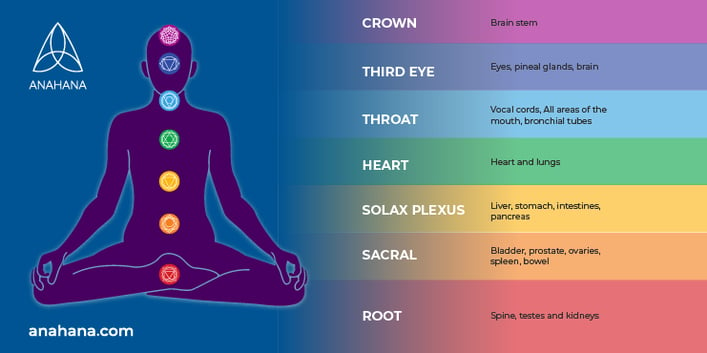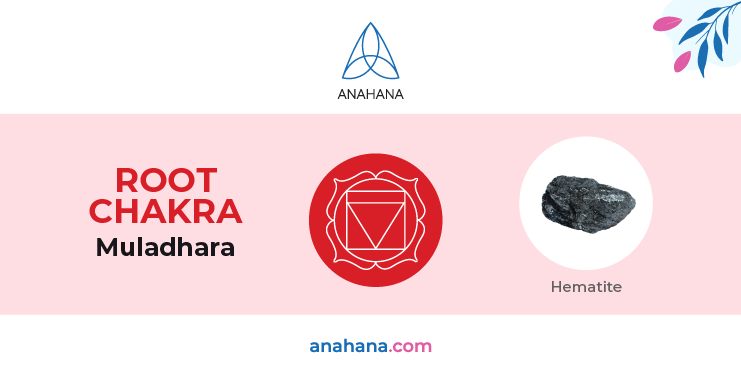
Table of Contents
The Root Chakra, or Muladhara chakra, is the first of the seven main chakras in the entire chakra system and is located around the coccyx or tailbone. It governs our basic needs for good health in the body, a sense of connection to the earth, and a feeling of support and stability in the physical world.
Outline of the Root Chakra
-
Location: Base of the spine (Coccyx, Perineum, Pelvic Floor)
-
Root Chakra symbol: Four-petaled lotus flower
-
Associated color: Red Chakra
-
Element: Earth
-
Bija Mantra (seed syllable, or seed mantra): LAM (sounds like llama)
-
Affirmations: Root Chakra Affirmations
-
Sanskrit Name: Muladhara (meaning: root, foundation)
-
Purpose: Foundation
-
Nerve Plexus: Coccygeal
-
Endocrine gland: Adrenals
-
Associated crystals: Root Chakra crystals such as Red Garnet, Red Jasper, Hematite
Origins of the Root Chakra and Chakra System

The chakra system originated in India between 1500 and 500 BCE. The ancient text called the Vedas was the first to mention seven primary chakras and introduced the energy system.
The Root Chakra is the first of the seven energy centers, representing the earth element and grounding. In Sanskrit, the Root chakra is called the Muladhara Chakra, which translates to two Sanskrit words - Mula, meaning root and Adhara, meaning support or base.
Following the Root Chakra is the Sacral Chakra, Solar Plexus Chakra, Heart Chakra, Throat Chakra, Third Eye Chakra, and Crown Chakra, which are all part of the subtle body energy system.
The definition of chakra is a “spinning wheel” of energy. The main chakras run from the spine's base to the head's crown.
Concepts of the seven chakras came to the Western world in the 1880s from tantric yoga traditions and are increasingly studied and practiced due to their extensive benefits.
Functions of the Root Chakra
The Root Chakra is the body's root, supporting solid bone structure and spiritual connection to the earth and the material world around us. A healthy Root Chakra governs physical and mental health and allows us to feel secure and safe during our journey through life.
Within the Root Chakra, people carry ancestral memories, including difficult histories of war, famine, and natural disasters. This has been demonstrated through the study of epigenetics.
These generational traumas can create patterns of behaviors in our own lives but can heal through deep inner work and chakra-balancing exercises.
Kundalini energy lies dormant at the base of the spine until wellness practices, such as meditation, asanas, pranayama, and prayer, awaken it.
When energy flows through the first chakra, people feel grounded and experience increased confidence. It will also give the other chakras a strong base for further development.
Blocked energy can negatively impact health in the physical body and mental state. Misalignment may result in the following symptoms:
Physical Symptoms
-
Weight gain
-
Incontinence
-
Weight loss
-
Constipation
-
Pelvic pain
Mental Symptoms
-
Depression
-
Poor focus
-
Feeling lethargic
-
Weak self-esteem
Other physical issues include colon, bladder, prostate, leg, lower back, and feet problems.
Energy, safety, and control issues can also arise, often leading to an eating disorder, including anorexia, binge eating, and bulimia.
If you think you may have an eating disorder, please seek professional help from a doctor or therapist.
If you are experiencing any of these symptoms, you may have a blocked Root Chakra. Try practicing some of our recommended exercises for Root Chakra healing, allowing life energy to flow freely through the body to improve well-being.
How to Open the Root Chakra

A balanced Root Chakra creates a foundation for each of the higher chakras and supports steady energy through the human body, supporting our connection to our surroundings and the earth.
This sense of calmness and control can help people focus on their personal growth, helping increase their quality of life.
Here are some of the ways to balance the Root Chakra using yoga, breathing, and chakra meditation:
Yoga Asanas
Both Kundalini yoga, yoga flow, and Hatha yoga practice effectively awaken the first chakra by activating the energy, seen as the vital life force center in the physical body. Additionally, several asanas help open the Mūlādhāra chakra. Although asanas with a yoga teacher are effective, they are not always necessary.
Here are three effective yoga poses that will get life-force energy flowing through the base chakra:
-
Uttanasana (Standing Forward Fold): Begin standing tall with your feet together. Slightly bend your knees and reach forward into a forward fold. Place your hands on the ground or behind your legs. Hold the stretch for several breaths and then relax.
-
Malasana (Garland Pose): Begin standing with your feet mat-width apart. Exhale as you squat down, allow the toes to turn out, and use your elbows to push your knees out. Bring your torso slightly forward, lengthen your back and keep your weight on your heels. Hold this for five or more breaths.
-
Vrikshasana (Tree Pose):The tree pose is arguably the most effective posture for creating a solid foundation. Begin standing tall with your feet firmly planted on the ground. After grounding your energy through the upper and lower body, bend one leg and place your foot flat against the inner thigh of the other leg. Place your arms in prayer in front of your chest. Hold this for several breaths, then repeat the tree pose on the other side.
Root Chakra Meditation
The practice of chakra meditation sends grounding energy through the human body. It supports spiritual awakening by connecting you to your higher self and a higher power.
Whether this is mother nature, God, or awakened consciousness, connecting to a higher spiritual plane of universal energy provides peace and stability. It is beneficial for the Root Chakra and all the chakras. Here are two suitable meditation techniques:
-
Body Scan Meditation: Begin by lying on your back in a comfortable position. Take a few deep breaths into your belly and relax your body. Begin the scan by bringing awareness to your feet and taking notice of any physical sensations that may arise. Rather than fighting the pain, breathe through it. Breathe into any tension or pain and visualize it leaving your body. Gradually work through all your body parts until you have scanned your entire body.
-
Focused Meditation: Begin by choosing a target for your focus, such as your breath. Sit quietly in a comfortable position, relax your body, and begin taking deep breaths into your belly. Shift your attention to your focused target. If you have chosen to focus on your breathing, for example, pay attention to the internal sensations you feel as you inhale and exhale.
Root Chakra cleansing and balancing will support a healthy chakra system. Additional ways to help unblock a chakra include participating in physical exercise, chanting, using Muladhara incense and essential oils, and reconnecting with the earth.
Walk barefoot on nature's floor and feel grounded as spiritual energies flow up the legs and through the spinal cord. These exercises allow the Root Chakra to feel connected to its surroundings.
Frequently Asked Questions
What does Root Chakra opening feel like?
When the Root Chakra opens, and energy flows freely, individuals feel safe, comfortable and confident. Symptoms of the chakra opening include feeling grounded, connected and secure. You may notice tingling, heating, or healthy changes in eating habits and sleep patterns.
Why is my Root Chakra tingling?
It is normal for people to feel tingling sensations or warming in the activating chakra. Tingling at the base of the spine is a sign that the Root Chakra is opening and flowing.
Common places you may feel these sensations during Root Chakra healing include the palms of the hands, the bottom of the feet and the pelvic floor.
What happens when the Root Chakra is overactive?
Symptoms of an overactive Root Chakra are similar to blocked Muladhara energy, the foundation of the "energy body." An overactive Root Chakra may affect an individual’s well-being.
Mental signs of Root Chakra imbalance include feelings of panic, anxiety and fear. People also commonly experience low self-esteem, panic attacks and eating disorders.
How do you use Root Chakra stones?
There are several ways you can use stones for Root Chakra healing. Some rocks that support a balanced Root Chakra include Bloodstone, Tiger's Eye, Moss Agate, Smokey Quartz, Black Onyx, Red Jasper, Garnet, Carnelian, Black Obsidian, Hematite, and Black Tourmaline.
Here are some ways to incorporate Root Chakra stones for healing into everyday life:
-
Meditation: Hold your chosen stone in your hands or on your Root Chakra. Sit in a comfortable position, close your eyes, and begin meditating.
-
In your home: Decorate your living space with Root Chakra stones to fill the room with balancing Root Chakra energy.
-
Jewelry: You can wear stones as a necklace, bracelet, or other types of jewelry. You can make a necklace by wrapping a rock in a wire.
-
Keep them with you: Keeping a Root Chakra crystal that resonates with you in your pocket or purse can allow you to carry the energy throughout your day.
Where is the Root Chakra of the earth?
Many people believe the earth’s location of the Root Chakra is on Mount Shasta in Northern California. It is one of the highest peaks in the Cascade Range, known for its spiritual presence and beauty.
Historically, Native American tribes have viewed the volcano as the creator's birthplace or the center of the universe.
References
A Complete Guide to the Chakras and Their Effects on the Mind, Body and Spirit
Chakras: Energy Centers of Transformation
All you need to know about muladhara, the root chakra
Disclaimer
The contents of this article are provided for informational purposes only and are not intended to substitute for professional medical advice, diagnosis, or treatment. It is always recommended to consult with a qualified healthcare provider before making any health-related changes or if you have any questions or concerns about your health. Anahana is not liable for any errors, omissions, or consequences that may occur from using the information provided.

By: Meriah McCauley
Meriah McCauley is passionate about the art and science of holistic health and healing. She explored the power of yoga through working with her mentor and guru Dr. Don Stapleton in Costa Rica. She also received a Masters in Psychology from Columbia University, specializing in Spirituality and the MindBody connection. Meriah now offers coaching, yoga teacher trainings, and Holotropic Breathwork for personal development. She loves to connect with those on this path.
